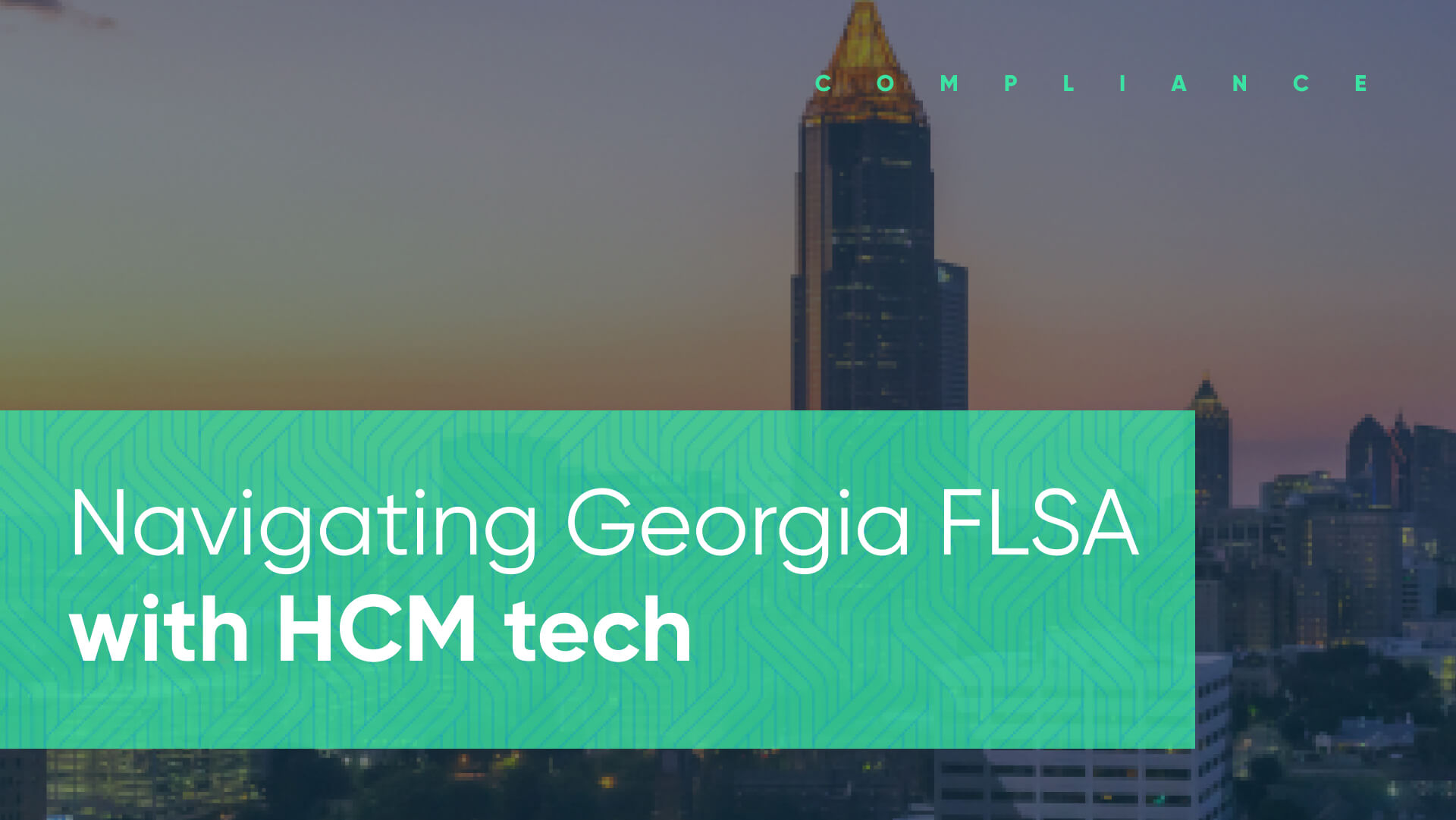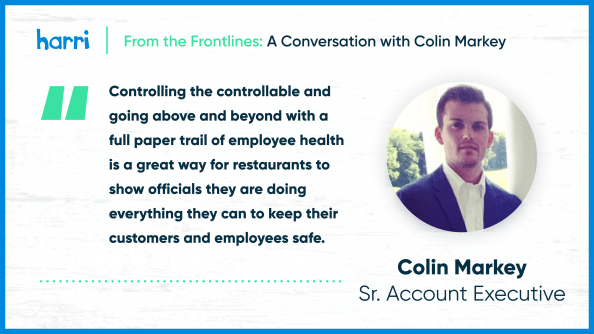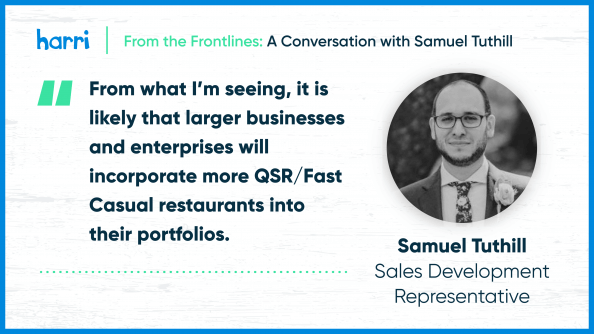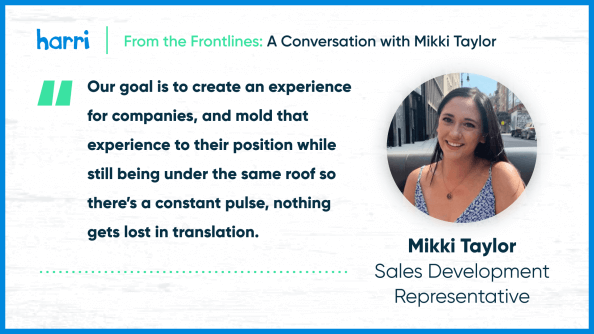Navigating Georgia FLSA with HCM Tech

- By Harri Insider Team | February 2, 2021
If you operate a hospitality or retail business, chances are you have confronted Fair Workweek legislation. Businesses that operate in the state of Georgia specifically must adhere to the Fair Labor Standards Act (FLSA).
FLSA establishes minimum wage, overtime, youth employment standards, and recordkeeping standards to create a stable, predictable work environment for service-based employees.
Below we break down the FLSA requirements and how each can be managed using an all-in-one HCM solution.
Who is covered under FLSA?
While technically not all employees are covered under FLSA, most are protected under the Georgia Fair Labor Standards Act. Hospitality employees are almost certainly covered under the FLSA.
Enterprise businesses
Make at least $500,000 per year
Individual employees
Any employee whose job involves “interstate commerce,” or commerce between states.
Interstate commerce is pretty broad and can cover anything from reading mail to answering phones.
Minimum wage and tipped employees
As of January 1, 2021, non-tipped employees covered under FLSA are entitled to $7.25/hr.
Tipped employees may make $5.15/hr as long as their minimum wage and their tips total to at least federal minimum wage. In this case, the federal minimum wage is $7.25/hr.
If an employee fails to meet $7.25/hr even with tip credit, it’s up to the employer to compensate them.
Overtime
Employees are entitled to overtime pay when:
- They’re asked to stay later than their shift end time
- Their workweek extends past 40 hours
Overtime pay consists of 1.5x an employee’s regular rate of pay.
Exemptions for overtime can be made for salaried employees and white-collar jobs. That means that all service-based employees, unless salaried, are entitled to overtime pay.
Restricted work time for minors
Under FLSA, minors may work but have some restrictions.
Minors age 14 and 15 can work:
- 3 hours on a school day
- 8 hours on a nonschool day
- 18 hours in a school week
- 40 hours in a nonschool week
They’re not permitted to work before 7 am or after 7 pm, however they may work until 9 pm from June 1 – Labor Day.
Meal breaks
Georgie FLSA does not require that employers give breaks or meal periods to their employees.
Employers are not required to pay employees for long breaks taken. Short breaks, on the other hand, are entitled to regular pay for the duration of that break.
Under FLSA, a long break:
- Lasts 30 minutes or longer
- Completely relieves an employee from duty for the purpose of eating a meal
“Short” breaks that do not fall under this criteria, must be paid.
Employee vs contractor
The Department of Labor clarified the standards of what’s classified as an “employee” and an “independent contractor” effective March 8, 2021.
The classifications follow the below guidelines to determine exact employment status:
- The nature and degree of control over the work
- The employee’s opportunity for profit or loss based on initiative and/or investment
Businesses that misclassify their employees are subject to legal fines.
Navigating FLSA labor laws using HCM tech
Similar to Fair Workweek labor laws, the Georgia Fair Labor Standards Act presents huge compliance challenges for hospitality businesses, especially those still operating under pen-and-paper processes.
However, the right HCM solution makes easy work of FLSA labor and wage compliance. Working with a compliance-minded platform does more than just provide peace of mind, it can protect your business from serious non-compliance fees.
Labor-compliant scheduling
A large majority of FLSA requirements revolve around the employee schedule. Managing who can work when, where, and for how long might be doable, but one oversight can result in a domino effect of premium payments or compliance violations. Image that, but at scale.
Intelligent scheduling tools like Harri are built with FLSA labor compliance in mind. Data-driven scheduling uses historic sales data to automatically generate labor-efficient schedules that don’t break compliance. Auto-fill schedules based on past weeks, or create schedules by employee positions, overtime proximity, and more.
Templated schedules, automated employee-driven shift swaps, and Hot Fill auto-scheduling ensure labor compliance without the headache for restaurants, hotels, and hospitality businesses.
And if you have to schedule minors? Our scheduling platform automatically detects your employee’s age using the birthday from their onboarding documents to prevent managers from scheduling them during minor-restricted timeslots.
Non-compliance alerts to avoid violations
Restaurant managers are no stranger to last-minute schedule changes. After all, hospitality is incredibly unpredictable, and sometimes you need to call in additional staff to service an unexpected rush.
When that happens, it can be easy to overlook if an employee is dipping into overtime hours or not permitted to work under overtime laws. Harri immediately sends managers non-compliance alerts so they can adjust operations accordingly and on-the-fly.
Real-time data-analytics across your entire business
Tracking every FLSA-related cost can be tricky. Employee-initiated shift swaps can make last-minute schedule changes much more manageable, but they make tracking critical data like overtime hours per week extremely difficult — especially for managers overseeing hundreds of employees.
Data-driven decisions drive stronger long-term business performance. Real-time, customizable data analytics ensure that no overtime payments, paid and unpaid breaks, sales spikes, or non-compliance fees go unaccounted for. View employee-specific data to learn if your new FLSA schedules are as cost-effective as you think they are, check sales by position to see if all employees are making at least tip-credit wages (and compensate them if not), or view data trends across your entire business.
The future of Georgia FLSA
FLSA has been around for a long time and it’s not going anywhere. However, with the rise of predictive scheduling laws like Fair Workweek, it’s possible that the Fair Labor Standards Act will adopt similar principles to create a stable work environment for employees.
If and when that happens, hospitality businesses with compliant-driven solutions will be prepared before those deadlines set in, ensuring minimal disruption to HR and operations.





















